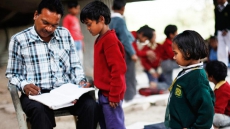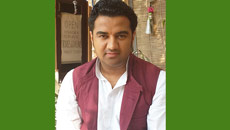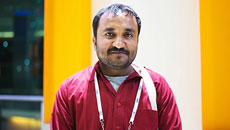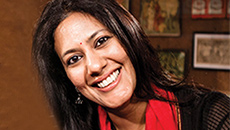Anshu Gupta’s organization Goonj not only collects clothes for donations but also ensures that each piece of clothing is mended before it is passed on to someone.
Anshu Gupta was 17 years old when he met with a car accident. He was on bed for a year and was admitted to hospital thrice. Gupta was supposed to undergo surgery but his father was not willing to pay the bribe the doctor demanded. In response, the doctors declared that Gupta would not be able to walk again. Today, this initiator of an extensive social movement walks several kilometers each day to lend supportthrough his non-governmental organization called Goonj. "Today when I walk many kilometers in the villages across India, I feel proud that I am walking on my feet and not on the bribed feet," says Gupta proudly.
What lead to the establishment of Goonj, explains Gupta were a couple of personal experiences. Gupta describes one such incident that occurred in Uttarkashi in 1991 where a massive earthquake left over 1,000 individuals dead and 10,000 houses were severely damaged or had collapsed. Gupta came across an elderly man who repeatedly said – “Ek kambal chaiye mujhey… kuch garam kapra de do... main mar jaunga..." (I need a blanket, give me warm clothes, I will die). Gupta could not fathom the man’s plead for clothes and not food or shelter. This was Gupta’s first disaster experience and he had no access to relief material. “A few hours later as I found some space to sleep under a plastic sheet, I soon understood his desperation for woolens and blankets. Even today I shiver, remembering that night,” says Gupta.
Another such experience was in Delhi where Gupta, a journalism student then was doing a story on Habib, a man who used to pick up unclaimed bodies from the roads. While doing the story Habib’s daughter told Gupta that "When I feel cold, I hug the dead body and sleep… It doesn't trouble me, it doesn't turn around.” Such disturbing encounters stayed with Gupta and became the genesis in the founding of the non-governmental organization, Goonj.
Though initially set-up as an organization that focused on clothing as a basic and unaddressed need, Goonj has grown profoundly to deliver other necessity goods such as bags and toys for kids and sanitary napkins for women. The NGO is redefining the need and approach of donations. In an interview Gupta had mentioned that "Somewhere we need to dignify giving by shifting the focus from donor’s pride to receiver’s dignity." He elaborates further on this by saying, “It’s very important for people who give material in the cities to understand that when we give our under-utilised material lying waste at home, we aren’t donating, we are discarding material. Also when we give material, often we give what we have, not what is needed by the person at the other end.” The organization believes that charity should not rob a person of his dignity. His ideas have been largely professed and some changes have been observed in the donations that now come in at the organization.
School to School (S2S) is a program started by Goonj that addresses the needs of school kids. Schools in rural areas are not fully equipped with basic amenities. Even worse, students are forced to dropout because of unimaginable and petty reasons such as incapability of parents to buy their children notebooks regularly. S2S “is addressing the educational needs of thousands of remote and resource starved village/slum schools channelizing underutilized material of city’s affluent schools,” says Goonj’s website.
The 2013 Uttarakhand flash floods where thousands were killed and a thousand others became homeless, Gupta employed constructive measures in ensuring that his organization
could provide maximum support and donations to those affected by the destructive force of nature.
Today Goonj has a full-time team of 180 people on its payroll including around 70 community workers and daily wagers who work in the deep interiors of rural India. “At the end of the day ours is a hardcore logistics work, where the processing of material (roughly 1000 tonnes every year) is looked after by our own team,” Gupta states.
Fifteen years into triggering change, and Gupta says the very basic need ‘cloth’ has not made it to the list of issues to work on in the development agenda. “Many people still think we collect and distribute clothes, not understanding that we use material as a tool to instigate action. The fact that somewhere it is the 'genesis of a parallel economy which is trash based not cash based’ needs to be communicated to people. Thus making people understand the ethos, impact and potential of the work, not just in India but across the world, is a big challenge. It needs to become a part of academics,” Gupta feels.
Over the coming years, the founder of this organization wants to streamline the processes, document the impact and innovation in its work to ensure that change is brought about on the policy level.






